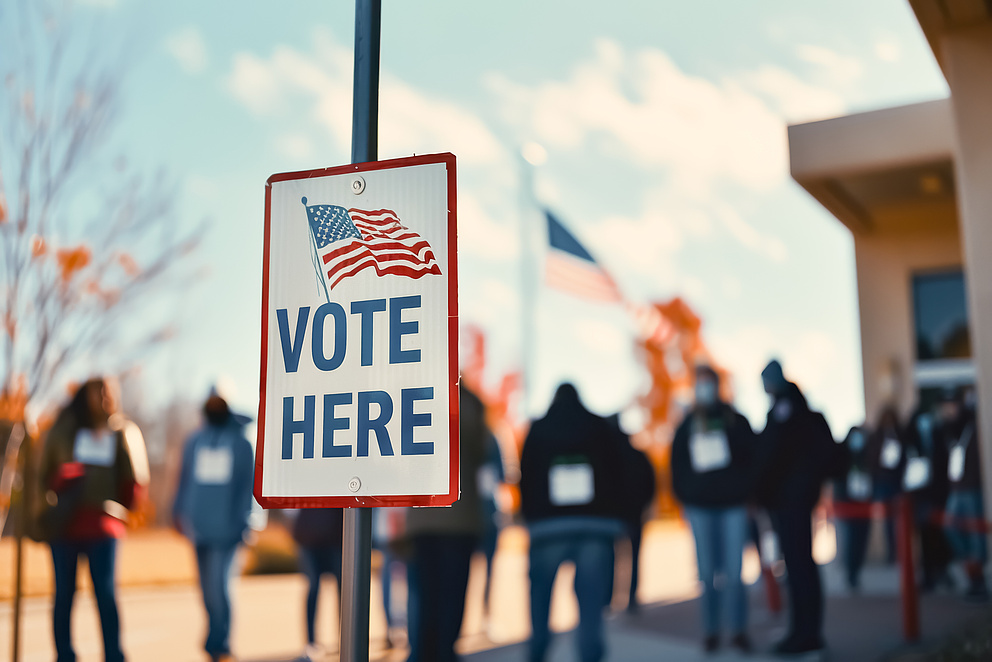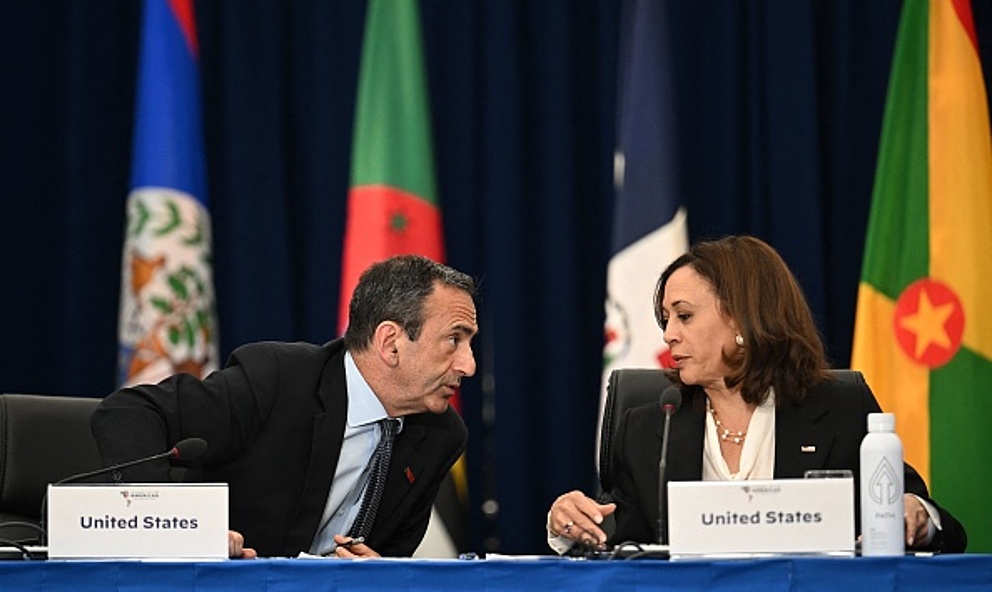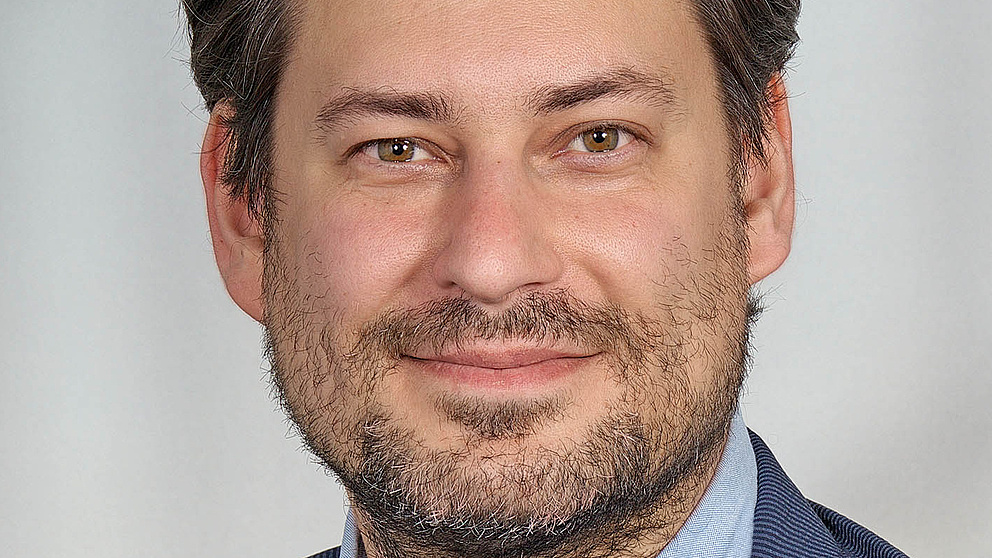

Contact
Press, Communications and Marketing
Tel.: +49 228 833-144
Fax: +49 228 833-441
presse[at]avh.de
On 5 November 2024, the United States of America will elect their next President and Vice President as well as a third of the US Senate and all 435 members of the House of Representatives. It is not only a crucial moment for the future of the nation but for global politics and transatlantic cooperation, too. Which direction will the country choose?
We asked former German Chancellor Fellow (2021 - 2022) and expert on US-China policy Michael Laha how the election result could affect foreign policy and international cooperation in the fields of science, technology and innovation.
Humboldt Foundation: Mr Laha, how do you judge the mood in the US so close to the elections?
The atmosphere is very tense. Everywhere. On TV, among my former employers in the States. At home and among my acquaintances and friends.
Many people in Europe are following the election campaign between Donald Trump and Kamala Harris with great interest. What do you expect if Kamala Harris wins – particularly with regard to foreign policy?
We can assume Kamala Harris will continue to adopt a very similar approach to Joe Biden. However, she has very few links to Europe, in contrast to Joe Biden who gets on very well with Europeans. Incidentally, the person currently responsible for Western Europe on Biden’s National Security Council is Laura Daniels, a former Humboldt German Chancellor Fellow.
Just like Kamala Harris’s National Security Advisor, Philip Gordon, who was also a German Chancellor Fellow. How do you rate his influence?
Mr Gordon is known as a transatlanticist who knows Germany pretty well. If Harris wins, we can assume that he will be decisive in steering the course of the Harris-Walz administration’s entire foreign policy. But he will then have to concentrate on China, too. This means we can hope for positive developments as he would be particularly well qualified to address European concerns about US policy towards China.

Tim Walz, Kamala Harris’s running mate, is reported to have a good relationship with China.
Yes, he lived there for some time. In the late 1980s, he taught English in China. At the time, he followed the protests on Tiananmen Square and how they were brutally suppressed. This experience left a great impression on him. Nevertheless, he decided to foster his contacts with China and not break them off. When he returned to the US, he set up a small business organising student exchange programmes between China and the United States. These experiences constitute a very good grounding. At the same time, he is extremely critical of China’s Communist Party because of its infringements on human rights. In his statements, he can thus differentiate very precisely between the people of China and the leadership. Given his experience, Tim Walz is, sorry, I can’t resist the pun, a trump card.
And what if Donald Trump wins? What precisely would this mean for science and innovation in the US and for transatlantic scientific relations?
Irrespective of who wins the elections, the disputes between the US and China will increase and extend to more areas of technology. In the last few years, we have witnessed fronts opening up in semiconductors, artificial intelligence, quantum technologies as well as e-mobility. It is now clear that biotechnology will join the list. I don’t think people in Germany have registered the implications of the topic as yet. This is something German politicians will need to work on.
What gives you the biggest headache concerning these aspects of technology development?
There’s one thing that is particularly worrying: the attempt by the US Congress to revive the so-called China Initiative. It was a programme developed by the US Department of Justice under President Trump with the aim of tracking down spying and technology theft. Instead, it led to a form of racial profiling that destroyed scientific careers and caused huge insecurity in the Chinese diaspora, particularly amongst researchers. President Biden suspended the programme shortly after taking office but the tensions in the Chinese research community in the US remained. If Trump becomes President again, Congress will propose another law of this kind which he would sign. If Harris were President, she wouldn’t do it. So, a very big difference.

Michael Laha is an expert on US-Chinese relations. From 2021 to 2022, he was a German Chancellor Fellow at the Mercator Institute for China Studies (MERICS) in Berlin. Since 2023, he has been a consultant at Sinolytics, a research-based management consultancy with a focus on China.

What changes do you think Europe will face?
In a bizarre kind of way, a second Trump administration could benefit Europe because Europe will become even more attractive for global talents, including Chinese researchers who are now so good that they can basically choose where they want to work. The distinguished American China expert, Barry Naughton, said the same thing about a year ago when he shared a platform with Bettina Stark-Watzinger, the Federal Minister of Education and Research, at a MERICS (Mercator Institute for China Studies) conference.
How do you think relations with China could change after the elections?
Among China experts in the States, there is a lot of discussion about whether the leadership in Beijing, and by that, I mean the state and party leader Xi Jinping himself and the people around him, would prefer a Trump or a Harris administration. I agree with the analysis by Rush Doshi who is a former advisor to Joe Biden and was the deputy senior director for China on the National Security Council. He thinks that Beijing wants to see Trump win because Trump 2.0 would seriously harm the US’s standing in the world and thus leave Washington less room for action. A second development would be that Trump will work more with tariffs. He regularly talks about it. But he doesn’t just say it to be provocative – although that also plays a role. He really believes in it.
How would you personally like the elections to pan out on 5 November?
The most important thing is that they end peacefully, irrespective of who wins, and that the results are accepted without problems. The second most important thing is to continue to strengthen transatlantic relations. A Harris-Walz administration would be an advantage here.
